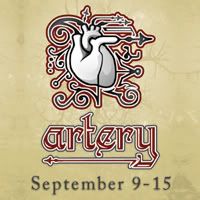word association
I have always been enamored by words and the employment of language to shape the world, convey our ideas, and define who we are as individuals and people. I'm a bit of a stickler (for better or worse, I don't know) when it comes to linguistic expression because I firmly believe that the message behind what we mean to say and how we say it must always be the same. Too often, we use words and phrases to signify one thing when our tone or even selection of words do little to communicate our original intent. I find this discrepancy in vernacular particularly troublesome when it concerns the ministry of the church. There are a few terms or phrases used flippantly by the "Christian culture" that truly irk me: First, going to church is totally off the mark. Whenever I have brought this up, most people see the inherent problem with it; the fact that the church is not a place but the people, that we don't go to church but we are the church. (I think the designation of the church as a mere location has far more undermining consequences than most people think.) The common response I get is that its the easiest way to describe the activity on Sundays to which ask myself (rather sarcastically)," Oh really? When has our faith become a thing of convenience?" Second, the term Sunday morning service gives me a bad vibe, specifically the word service. When I hear service, I think of going to the car dealership and getting my car checked; the mechanics perform the necessary maintenance whereby I'm obligated to pay for the service after its all done. There are conditions of work and payment in exchanged for one another. How does that fit with what goes on during those times of worship when we gather together? How about this description from the 411 instead: "Hi-riser groups gather together weekly to worship God corporately. These congregational times of worship are called Celebrations. Our style of worship reflects our communities. We worship Jesus through praise, prayer, baptism, communion, scripture reading, proclamation, the arts, media, and technology. We strive for excellence in everything we do because God deserves our best...we realize worship is not limited to music. Real worship is meeting God." Third, with the understanding that worship is genuinely experiencing God, Worship Leader is a bit of a misnomer. This stems from the modern misuse of worship as being synonymous with music when, in fact, music is but an element of worship and not its entirety. Music Pastor or, even better, Lead Worshipper may be more accurate replacements. Last (for now) is the prevalent response after the sermon has been given," I didn't get anything out of it." Such an evaluation of God's message expresses an element of the current consumerist trend that has remarkably influenced the "Christian culture". Perhaps we are too used to being entertained by movies or television where we sit and demand to have our senses engaged that we forget, as we gather together, our King is in our midst; that we are called to be like Mary at the feet of Jesus, soaking in His words while being overwhelmed by His presence.
In "The Search to Belong", Joseph R. Myers writes," Language may be the key element for developing and nurturing community. We must discover the language that moves our definition of community forward while at the same time give our culture a lexicon people can use to express their community experience." Some may say that all this is just a matter of semantics and that it doesn't necessarily carry the magnitude of meaning that I suggest. Maybe, maybe not...but why risk it? Why not be as intentional and purposeful as we can when talking about our spiritual life and describing our faith? Who or what are we saving our breath and words for? We may know what we really mean but do others?
In "The Search to Belong", Joseph R. Myers writes," Language may be the key element for developing and nurturing community. We must discover the language that moves our definition of community forward while at the same time give our culture a lexicon people can use to express their community experience." Some may say that all this is just a matter of semantics and that it doesn't necessarily carry the magnitude of meaning that I suggest. Maybe, maybe not...but why risk it? Why not be as intentional and purposeful as we can when talking about our spiritual life and describing our faith? Who or what are we saving our breath and words for? We may know what we really mean but do others?




0 Comments:
Post a Comment
<< Home